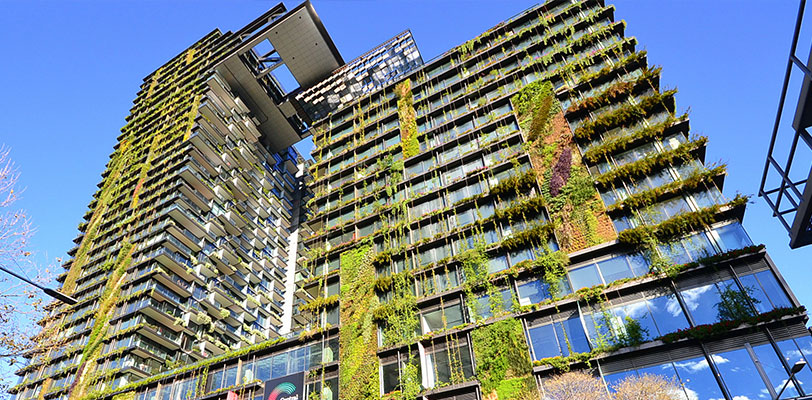Research Project
CTBUH-IIT Team Wins Grant for Green Wall Facade Research
Project Start: March 2012
Project Completion: May 2013
Principal Investigators: Payam Bahrami, Optim Design
The Council on Tall Buildings and Urban Habitat and several members of the Illinois Institute of Technology faculty have been awarded a grant from the Wanger Institute for Sustainable Energy Research (WISER) to study the energy-saving effectiveness of green wall façade systems.
The project will analyze the ability of green wall systems, such as hanging gardens and “living walls,” to improve a building’s energy performance by decreasing heat transfer through facades. The study will also quantify the potential energy savings.
“This is developing as a key topic for the building industry as designers look for new ways to reduce a building’s energy consumption without reducing the aesthetics and atmosphere,” said CTBUH research associate Payam Bahrami.
Building designers are increasingly incorporating green walls into projects in an effort to improve the energy efficiency of buildings. The building industry uses 50.1 percent of all energy produced in the U.S., according to the U.S. Energy Information Administration. While glass and metal give modern building facades sleek appearances, their lower thermal resistance to heat transfer results in higher heating and cooling loads.
Green wall facades are seen as one solution to creating more sustainable buildings. Green walls consist of plants integrated into vertical building surfaces, including hanging gardens, living walls and bioshaders.
This new study will develop a green wall model to simulate thermal processes in facade-integrated vegetation systems. A separate vegetation model will be developed to account for the thermal properties of plants and thermal processes in vegetation.
The $25,000 grant from WISER’s Interdisciplinary Seed Funding Grants program will be used to leverage larger grants, Dr. Bahrami said. Based at IIT, WISER focuses on developing innovative education and research programs to promote sustainability and clean energy.
The interdisciplinary team assembled for this research project includes Professor Peter Osler, Director of the Landscape Program in IIT’s College of Architecture , Dr. Herek Clack of the IIT Armour College of Engineering, Dr Antony Wood from IIT’s College of Architecture and CTBUH Executive Director, Dr Payam Bahrami, Research Associate for the CTBUH, IIT architecture PhD candidate Irina Susorova and two graduate students will also assist on this project.

Steering Committee Members
Project Milestones
About the Funding Partner
The Wanger Institute for Sustainable Energy Research (WISER) serves as an umbrella organization to enhance and promote research, education, and outreach activities at Illinois Institute of Technology that are related to energy and sustainability. WISER also coordinates the initiation of research collaboration internally between IIT faculty and externally with other universities, research laboratories, and industry.
To continuously initiate the development of new cross-disciplinary collaborative research areas, WISER has established the WISER Cross-disciplinary Seed Funding Grants (CSFG) program, with the expectation of enhancing our competitive edge in attracting major external funding in areas related to energy and sustainability.
More than 80 Faculty Affiliates are currently involved with WISER across the various colleges, research institutes, and centers at IIT.
WISER's research objective is aimed at fighting climate change and water shortage, which requires a focus on energy efficiency and gradual movement toward decarbonization of energy. This strategy requires the continuous substitution of carbon-based energy by renewable sources. To achieve this goal, current WISER research and development initiatives include:
Videos
Podcast
Research with us
The CTBUH research platform accommodates a wide variety of subjects and scales, while its vast network of industry leaders and city-shapers offers the ideal promotional stage upon project delivery. Get in touch with our team and learn how we can work together to fill the gap in your research needs.
Contact UsGet the Latest News and Updates from CTBUH
Fields with an asterisk (*) next to them are required.
View our privacy policy

